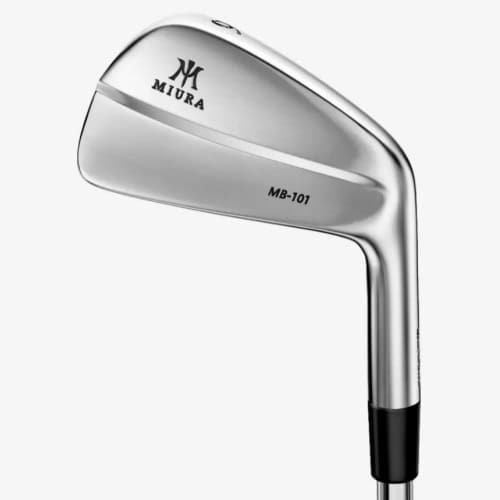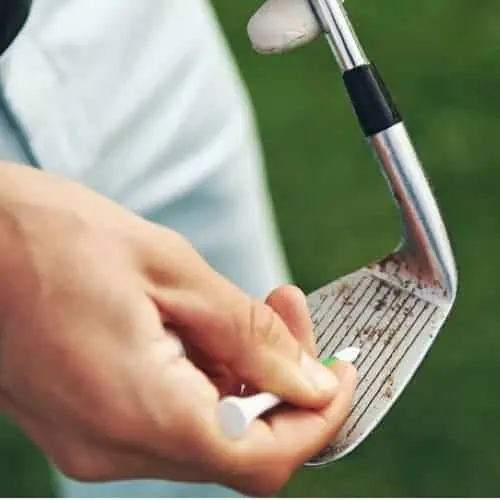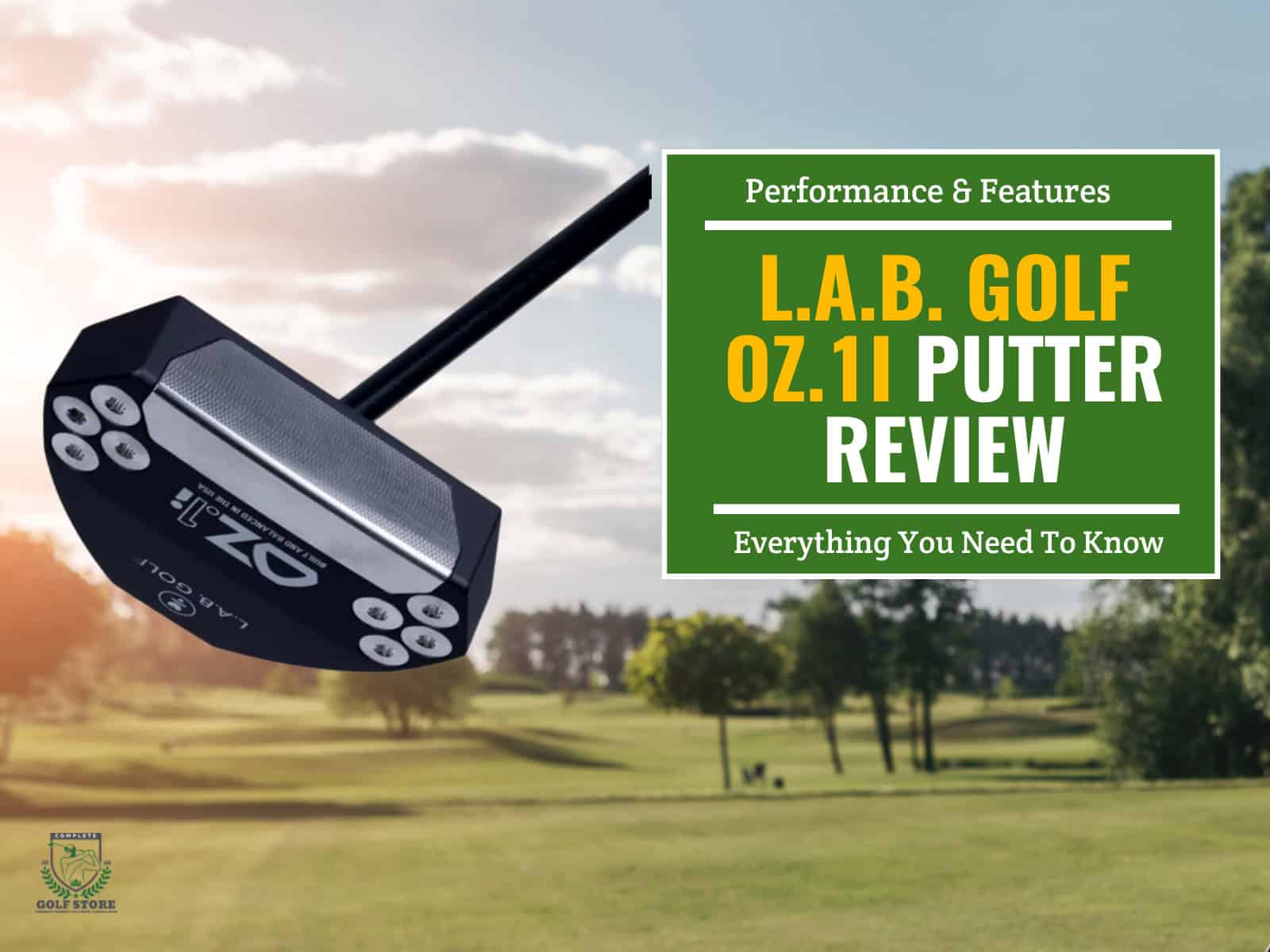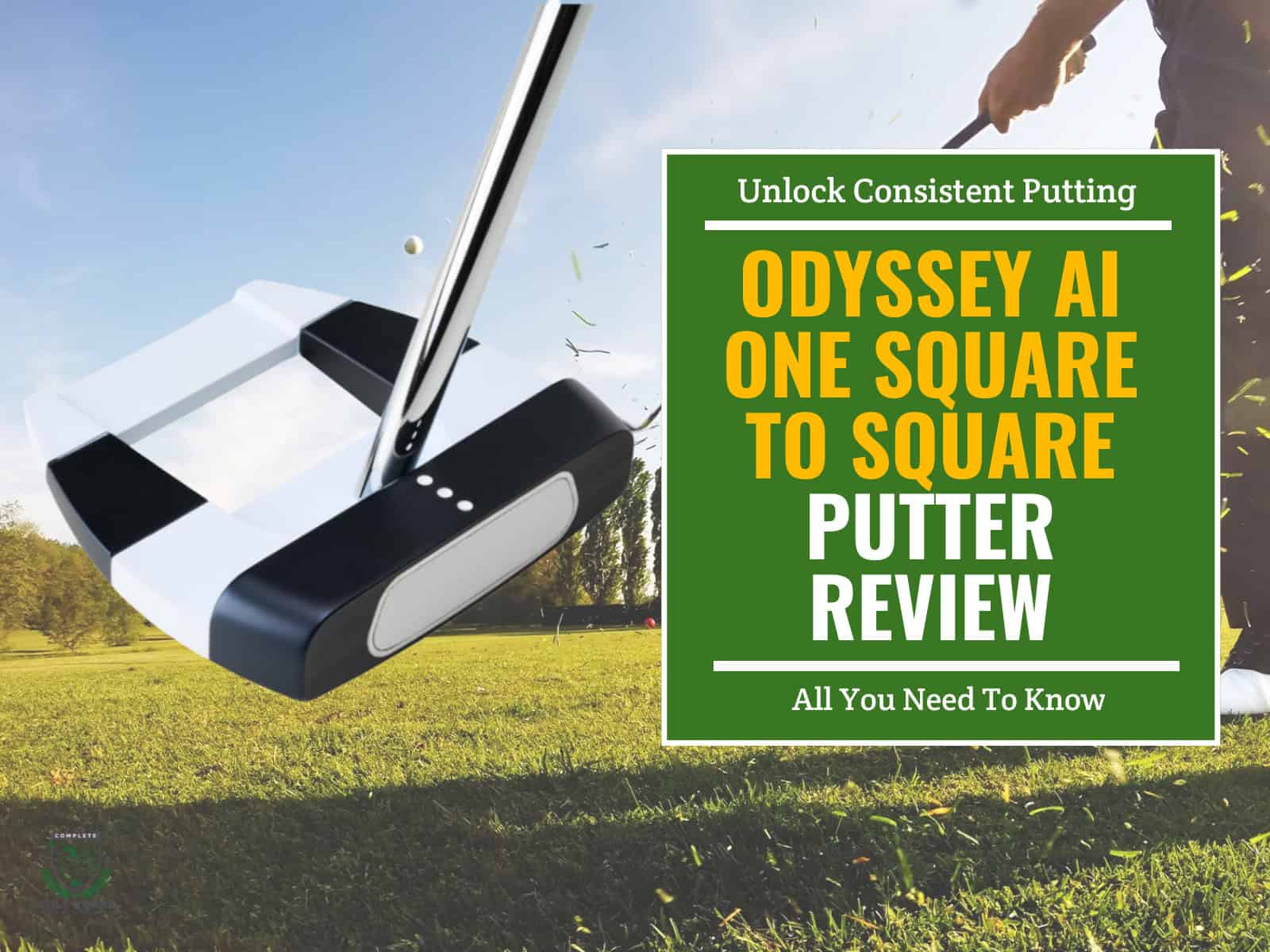Golf irons have undergone a remarkable evolution since the game’s inception, with advancements in technology, design and materials transforming the way golfers approach their shots.
The best irons of all time have left a lasting mark on the sport; these include the classic blades used by golf legends as well as the cutting-edge game-improvement irons of today.
In this article, we will take a journey through history, exploring the most iconic and influential irons ever created. We’ll examine the unique features and performance characteristics of these clubs and discuss how they have shaped the game we know and love.
| Product | Features | Our Rating | Purchasing Options |
|---|---|---|---|
 SRIXON Z-FORGED II - Best for Elite Ball-Strikers |
| ||
 Miura MB101 - Best for Purists and Traditionalists |
| ||
 Callaway Apex Pro Smoke - Best for Low-Handicap All-Rounders |
|
Note: Prices listed on this page are subject to change. To view the latest pricing information, please check the vendor's website directly using the links provided.
How Do We Test Golf Irons?
We evaluate iron sets through extensive on-course testing, not just range sessions with a single 7-iron. Each set gets tested by golfers at different skill levels across various lies: tight fairways, thick rough, hardpan, and challenging slopes that reveal true performance.
We deliberately hit shots thin, fat and off-center to assess real-world forgiveness, while checking consistency between clubs in the set.
For our section on legendary discontinued models, we hunt down pristine examples of classic blades and cavity backs that shaped modern design, comparing their performance against today’s technology. For those priceless clubs, we focused more on the way they contributed to or even revolutionized golf.
Our Selection of Golf Irons You Can Get in 2025
The following are our top picks for the best irons to get today based on our own testing, research and experience.
#1 - SRIXON Z-FORGED II – Best for Elite Ball-Strikers
Club Material: Forged 1020 Carbon Steel
If you’re the type who thrives on shaping shots and living off crisp turf interaction, the Srixon Z-Forged II offers a no-nonsense blade built for elite ball-strikers. Clean lines, compact profile and forged feel—it’s every purist’s playground. But be warned, it rewards precision, not forgiveness.
The PureFrame construction focuses weight behind the sweet spot, providing laser feedback on center strikes. The Tour V.T. Sole offers buttery smooth turf interaction.
Design and Technology
Crafted in collaboration with Srixon’s tour staff, the Z-Forged II irons feature a traditional muscle back blade design with subtle modern tweaks. PureFrame technology thickens the sweet spot for enhanced feel without altering the profile. Each head is shaped to perfection, offering a clean, compact look at address, while the Progressive Groove design delivers variable groove depths: wider in long irons for control, tighter in short irons for spin.
Performance
On the course, these irons behave like an extension of your will—responsive and razor-sharp. Long irons glide through turf with consistent distance control, and the short irons bite hard, letting you work the ball into tight pins. While they don’t offer much forgiveness on mishits (and they’re not trying to), they shine when intentionality and clean strikes are your goals.
Feel and Forgiveness
Feel is the main event here. Thanks to the 1020 Carbon Steel forging and PureFrame shaping, impact feedback is like reading a fingerprint off the face. Every strike tells you a story. But let’s be clear—forgiveness takes a backseat. Off-center shots feel (and fly) noticeably worse than with cavity backs or even some players’ CBs. Still, for elite ball-strikers, that honest feedback is the point.
Specifications
- Material: 1020 Forged Carbon Steel heads for unmatched feel
- Shaft Material: Steel shafts (stiff or extra stiff) ideal for aggressive swingers
- Grip: Standard-size synthetic rubber for secure, no-slip contact
- Club Length: Standard 45 inches overall length
- Weight: Approximately 8 pounds (full set)
- Loft Progression: Traditional lofts optimized for controlled trajectory
- Grooves: Progressive—wide in long irons, tight and deep in short irons
- Set Composition: 7 clubs (typically 3-PW or 4-PW)
Pros
- Exceptional forged feel with PureFrame technology
- Compact blade profile perfect for shaping shots
- Tour V.T. Sole improves turf interaction across lies
- Progressive grooves enhance distance control and spin
- Clean, traditional look at address
Cons
- Minimal forgiveness on off-center hits
- Demands consistent ball-striking to unlock full performance
Why We Ranked It as the Best for Elite Ball-Strikers
The Z-Forged II checks every box for elite players: pure forged feedback, shot-shaping control and uncompromised design precision. It isn’t built to mask errors, but to amplify intention. That’s why it is one of the best golf irons for elite ball-strikers who crave absolute feel and workability.
#2 - Miura MB101 – Best for Purists and Traditionalists

Price Range: $2,441.87 – $ 2470.92
Club Material: Forged Carbon Steel with Nippon NS Pro Modus 3 Tour 130 S Steel Shafts
If you’re after a no-frills, old-school blade that rewards precision and feels like an extension of your hands, the Miura MB101 irons should be on your radar. They’re unforgiving in the best way, exposing flaws but rewarding purity. Built with a nod to tradition, these irons are ideal for purists and traditionalists who crave control and feedback.
Design and Technology
The MB101’s main feature is its timeless muscle-back design. Each iron is forged with meticulous care to ensure consistency across lofts, lies and offsets. The slightly extended hosel offers added stability and nudges the sweet spot slightly toward the heel, a minor tweak that better players will appreciate.
Performance
Performance-wise, the MB101 is a scalpel. It excels when shot-shaping matters (be it a baby draw into a tucked pin or a soft fade against the wind). The club’s shape promotes crisp, controlled contact, and its refined sole glides through turf like it knows the shot you’re envisioning. Unlike cavity backs or hollow players’ irons, there’s no built-in safety net here, making it more demanding, but also more rewarding. Those who’ve played blades like the Hogan Apex 99 or Ping Eye 2+ will feel right at home.
Feel and Forgiveness
Here’s where the MB101 really separates itself. The feel is pure—soft yet solid—with no vibration left to chance. Feedback is immediate. Mishits sting slightly but teach quickly, reinforcing better swings. Forgiveness is minimal, but for traditionalists, that’s part of the appeal. It’s about accountability and the rush of getting it just right.
Specifications
- Set Makeup: 4-PW (7 clubs)
- Shaft: Nippon NS Pro Modus 3 Tour 130 S (Stiff flex)
- Grip: Lamkin UTX Cord
- Club Lengths: Progressive from long to short irons
- Lofts: Consistent with traditional blade specs (e.g., 47° PW)
- Lie Angles: Precisely tuned for each iron
- Face Progression: Minimal, keeping traditionalists in control
- Weight: Balanced for control over power
Pros
- Extremely tight manufacturing tolerances and build consistency
- Superior turf interaction thanks to the refined sole
- Clean, traditional profile appeals to blade purists
- Enhanced control over shot shape and trajectory
- Confidence-boosting setup at address
Cons
- Demands precision—misses are penalized
- Price point is premium
Why We Ranked It as the Best for Purists and Traditionalists
The MB101 isn’t just another blade—it’s a masterclass in precision and purity. Every detail speaks to the purist’s pursuit of perfection. From the handcrafted feel to its sole refinement, it echoes the design philosophies that shaped golf’s golden era, making it the ideal choice for those who value tradition above all.
#3 - Callaway Apex Pro Smoke – Best for Low-Handicap All-Rounders
Club Material: Forged 1025 mild carbon steel body with steel shafts
The Apex Pro Smoke 19 irons walk the line between precision and distance, giving low-handicap players a rare blend of control, feel and speed. With a forged body, Tour styling, and smart use of tungsten and urethane microspheres, these irons bring elite-level performance into a stunning, modern package.
Design and Technology
The Apex Pro Smoke impresses with its refined Tour profile: a thinner topline, higher toe, straighter leading edge, and hosel transitions. The forged body is made from 1025 mild carbon steel, ensuring a pure feel. What sets it apart are the 360 Face Cup in longer irons and the variable face thickness (VFT) in shorter irons—both aimed at optimizing distance and spin control where you need it. The dark Smoke PVD finish looks sharp, resists glare and adds a modern edge.
Performance
Right away, these irons deliver Tour-level consistency off the turf. The tungsten weighting, averaging 50g per iron, strategically lowers the center of gravity to improve launch angles and shot control. In the longer irons, the 360 Face Cup makes it easier to chase distance on approach shots, while the VFT in scoring irons improves spin and flight. Compared to traditional forged blades, the Apex Pro Smoke 19 brings more playability without sacrificing workability.
Feel and Forgiveness
Despite the Tour profile, the Apex Pro Smoke offers a surprising dose of forgiveness for its class. Urethane microspheres dampen vibration by 56% via True Temper’s Elevate Tour 115 shafts, giving it a cushioned yet responsive feel at impact. Mishits won’t rattle your hands, but they’ll still let you know (ideal feedback for skilled players refining shot shapes). It’s a balance that sets these apart from stiffer, harsher blade sets.
Specifications
- Set Makeup: 4-9 Iron, PW, AW
- Loft: 15° on long irons; progressive through the set
- Shaft: True Temper Elevate Tour 115 (Steel, Stiff Flex)
- Weight: 2.2 Lbs. (1 kg) per club
- Finish: Smoke PVD coating for glare reduction
- Hand: Right-hand only
- Construction: Forged 1025 carbon steel body with tungsten weighting
- Extras: Urethane Microspheres for enhanced feel
Pros
- Tour-level shaping with added forgiveness
- 360 Face Cup tech increases distance in long irons
- VFT face in short irons boosts spin control
- Soft, forged feel with excellent vibration dampening
- Appealing Smoke finish with premium shaft setup
Cons
- Premium price may be prohibitive for some
- Not ideal for beginners or high handicappers
Why We Ranked It as the Best for Low-Handicap All-Rounders
The Apex Pro Smoke 19 blends elite shot-shaping precision with modern tech that enhances distance and playability, making it the best pick for low-handicap all-rounders who want Tour-style control without giving up forgiveness or feel.
#4 - TaylorMade Golf P770 – Best for Compact Distance
Club Material: Forged 8620 Carbon Steel Body with 4140 Steel Face
Compact yet loaded with technology, the TaylorMade P770 irons pack a punch in a smaller footprint. These irons offer the finesse of a player’s iron with the power and forgiveness of modern engineering. With progressive CG design and SpeedFoam Air, they bridge performance and feel in a way that’s tailored for players seeking compact distance control.
Design and Technology
Sleek from every angle, the P770 is built with a forged hollow body, incorporating 8620 carbon steel and a forged 4140 steel face. The best feature here is the FLTD CG, where the center of gravity is lowest in the long irons and gradually rises through the set. This progression promotes easy launch in longer clubs and improved spin in scoring irons. It also includes the Thru-Slot Speed Pocket and Progressive ICT (Inverted Cone Technology), designed to maintain ball speed across the face even on mishits.
Performance
These irons shine through their intelligent CG layout and face flexibility. The long irons fly high and stay online thanks to the tungsten weighting, while the short irons allow you to work on wedge-range approaches. Compared to larger distance irons, the P770s produce more predictable results without giving up too much ball speed.
Feel and Forgiveness
Despite their smaller profile, forgiveness is far from absent. SpeedFoam Air (69% lighter than the original SpeedFoam) provides vibration dampening, helping create a crisp yet cushioned feel on impact. Mishits toward the toe or low on the face still travel with commendable carry.
Specifications
- Set Configuration: 4-PW (7 irons total)
- Loft: 61 degrees for the pitching wedge, progressively lower in longer irons
- Hand Orientation: Right
- Shaft: Stiff steel
- Material: Forged 8620 carbon steel body, 4140 steel face
- Grip: Synthetic rubber
- Design Feature: FLTD CG, SpeedFoam Air, Thru-Slot Speed Pocket
- Dimensions: 5″ L x 5″ W x 46″ H per club
Pros
- Compact head shape ideal for confident ball striking
- Forged feel with cavity back forgiveness
- Progressive CG offers excellent launch and spin balance
- SpeedFoam Air enhances both feedback and face flexibility
- Consistent performance across the face, even on low hits
Cons
- Smaller head may intimidate high handicappers
Why We Ranked It as the Best for Compact Distance
The P770 irons earn top marks because they deliver consistent, controlled yardages without sacrificing feel or forgiveness. Their intelligent design suits the discerning player who values precision and streamlined looks, all while still benefiting from modern distance-enhancing tech.
#5 - Cobra King Tour Irons – Best for Consistency-Focused Players
Club Material: 1025 Carbon Steel (5-Step Forged)
If you’re looking for consistency-focused irons without giving up feel or workability, Cobra’s King Tour Irons deliver exactly that. With a compact profile, premium forged construction and subtle forgiveness features, they’re designed for players who want precise shotmaking and dependable results throughout the bag.
Design and Technology
Unlike many cavity backs, the King Tour irons feature a 5-step forged 1025 carbon steel construction for a dense, consistent feel across all shots. Cobra incorporates CNC-milled undercuts behind the face, allowing for strategic weight redistribution that lowers the center of gravity. Combined with a TPU insert and aluminum medallion, the design reduces vibration and enhances sound. Compared to the King Forged TEC model, these irons have a thinner topline and shorter blade length for better shot shaping and a more compact appearance.
Performance
Where these irons shine is in consistent flight and workability. The progressive shaping, compact in the scoring irons and slightly more forgiving in the longer irons, helps maintain distance control without punishing off-center hits. Compared to full blades, the stability from the CNC undercut cavity gives more confidence on off-days. Shots hold their lines well and offer a high, penetrating trajectory, ideal for players focused on repeatable ball flights and course management.
Feel and Forgiveness
Despite their clean profile, these irons are surprisingly forgiving. The TPU insert, positioned behind the sweet spot, delivers a soft yet responsive feel at impact, noticeably more plush than older forged blades I’ve hit. While the club rewards centered strikes with pure feedback, mis-hits still produce playable results, especially in the mid-irons.
Specifications
- Set Composition: 4-PW (7 clubs)
- Head Construction: 5-step forged 1025 carbon steel
- Cavity Design: CNC-milled undercuts with TPU vibration dampening
- Finish: Silver tour-inspired finish
- Grip: Lamkin Crossline (corded, synthetic rubber)
- Shaft: KBS $-Taper steel shafts, known for mid-launch and tight dispersion
- Hand: Right-hand only
- Club Lengths: Standard
- Lofts and Lie Angles: Progressive, optimized for flight control
Pros
- Excellent feel and feedback from forged carbon steel
- Subtle forgiveness due to cavity back and CG optimization
- Compact shaping for workability without being intimidating
- Tour-level aesthetics and craftsmanship
- Strong sound and vibration control from TPU insert
Cons
- Not ideal for high-handicappers or those needing max forgiveness
Why We Ranked It as the Best for Consistency-Focused Players
The King Tour Irons balance control and forgiveness, exactly what a consistency-focused player needs. With stable launch conditions, pure feel and enough help on mis-hits, they let you play with confidence and precision over 18 holes, round after round.
#6 - Wilson Staff Model Steel CB – Best for Classic Cavity Back Feel
Club Material: Forged 8620 Carbon Steel
Built for the golfer who needs precision, balance and classic feedback, the Wilson Staff Model CB irons revive the traditional cavity back experience with modern precision. The forged feel, sharp control and subtle forgiveness deliver confidence from long irons to short. It’s a throwback that doesn’t sacrifice tech.
Design and Technology
Taking cues from Wilson’s Dyna-Powered legacy, the fluid feel hosel on the Staff Model CBs redistributes unused weight toward the toe, enhancing balance without bloating head size. A precision milled cavity back ensures clean lines and sharp feedback across the face. Unlike cast clubs in the same tier, the forged 8620 carbon steel maintains a soft yet solid strike that skilled players often seek.
Performance
While many irons today lean heavily on distance, the Staff Model CB leans into control and consistency. The milled face grooves boost spin and allow better stopping power on approaches, especially from mid to long irons. Compared to bulkier cavity backs, these irons forgive without feeling numb, giving feedback that’s audible and tactile—a must for refining ball flight and distance gaps.
Feel and Forgiveness
The classic cavity back feel is crisp but not harsh, and the ball seems to stay on the face a fraction longer, which adds to confidence during impact. The weight flow, particularly toe-focused, minimizes those dreaded pulls to the left without closing the face unnaturally. It’s not as cushioned as foam-filled designs, but that’s precisely the point: it’s all about feel you can trust.
Specifications
- Configuration: 4, 5, 6, 7, 8, 9 Irons + Pitching Wedge
- Hand Orientation: Right-Handed
- Shaft Material: Steel
- Flex: Stiff
- Loft Range: Starts at 23° (4-iron)
- Weight: ~2.7 lbs per club
- Grip Type: Synthetic Rubber
- Build: Forged 8620 Carbon Steel Construction
- Model Year: 2024
Pros
- Excellent feedback and turf interaction
- Ideal balance of workability and forgiveness
- Classic forged cavity back feel
- High spin and stopping power
- Sleek, tour-inspired look
Cons
- Demands a confident swing; not beginner-friendly
- Limited flex and hand options
Why We Ranked It as the Best for Classic Cavity Back Feel
These Wilson CBs blend tour-level shaping with a timeless cavity back feel, making them the perfect fit for players chasing responsive feedback, elegant control and soft impact sensations. Few modern irons capture the soul of classic forging while still offering modern forgiveness like this set does.
#7 - Mizuno JPX923 Tour – Best for Feel-Driven Shotmakers
Club Material: Grain Flow Forged 1025E Pure Select Carbon Steel
Engineered in Japan and forged for elite performance, the Mizuno JPX923 Tour irons are built for players who crave feedback and surgical control. The fine-tuned acoustics, soft carbon steel and copper layering make every strike meaningful. They’re priced on the premium side but deliver where it counts: precision, feel and consistency.
Design and Technology
The JPX923 Tour irons fuse tradition with cutting-edge refinements. Forged from 1025E Pure Select carbon steel at Mizuno’s renowned Hiroshima facility, the heads offer a refined grain structure that amplifies feel. A thin copper underlay beneath a nickel chrome finish adds a buttery softness at impact, a trait increasingly rare in modern irons. The V-Chassis design, powered by Mizuno’s Harmonic Impact Technology, enables a slimmer topline while preserving essential sound and vibration control, which is essential for those who play by ear and hand.
Performance
These irons are about ball-striking precision. Shotmakers will appreciate how they frame the ball cleanly and reward center-face hits with effortless flight and trajectory control. Unlike game-improvement irons that mask errors, the JPX923 Tours lay your swing bare (in a good way). Compared to the Ping i230 or Cobra King Tour, these offer a tighter dispersion pattern and cleaner turf interaction for those who already have a consistent swing.
Feel and Forgiveness
Feel is where the JPX923 Tour shines brightest. Every shot transmits immediate feedback, from flush contact to slight mishits. The forged carbon steel construction with its copper underlay creates a sensation that’s plush but not muted. Compared to irons like the Callaway Apex Pro Smoke, these provide more feedback and less forgiveness—a tradeoff that feel-first players will embrace. Off-center strikes are acknowledged but not punished severely, maintaining playability for high-level amateurs.
Specifications
- Set Configuration: 8 clubs (4-GW)
- Shaft: True Temper Dynamic Gold 120 S300 – Stiff flex, ideal for control
- Grip: Golf Pride MCC Teams Blk/Gry – standard size, high traction
- Material: Grain Flow Forged HD 1025E Carbon Steel
- Club Weight: Approx. 9 pounds total
- Hand Orientation: Right-hand
- Dimensions: 40″L x 4″W x 4″H per club
Pros
- Outstanding feedback and shot control on center strikes
- Premium forged carbon steel with copper underlay for enhanced feel
- Slim topline with tour blade profile inspires confidence
- Fine-tuned acoustics and impact feedback
- Built at Mizuno’s legendary Japanese forge
Cons
- Limited forgiveness on off-center hits
- Soft metal construction prone to bag chatter and wear
Why We Ranked It as the Best for Feel-Driven Shotmakers
The Mizuno JPX923 Tour irons deliver the ultimate experience in precision, responsiveness and shot feedback. If you value the pure sensation of center contact and crave an honest read on every swing, this set rewards skill and feel like few others can.
#8 - Titleist T150 – Best for Precision with Added Speed
Club Material: SUP-10 steel, soft iron, tungsten nickel (head); Alloy Steel (shaft)
The T150 blends the compact look of a player’s iron with subtle enhancements that promote added speed. Thanks to its SUP-10 and tungsten nickel construction, you get improved launch, control and stability. Compared to more blade-like models, the T150 adds an edge in speed and distance without compromising on the feedback skilled players demand.
Design and Technology
Borrowing inspiration from the T100, the T150 3G introduces a slightly larger head profile with a dual cavity structure. The forged body uses SUP-10 for the long irons and soft iron for the scoring clubs, while tungsten nickel weighting in the #4 to #7 irons adds critical mass for enhanced stability. A brushed nickel chrome finish tops off the head with a premium, tour-level aesthetic. This refined design gives more room for speed-enhancing tweaks, while preserving the look that better players appreciate.
Performance
Despite its compact profile, the T150 performs like a distance iron. The internal muscle channel increases launch and carry with improved ball speed, especially in the longer irons. The tungsten weighting ensures tighter dispersion, even on slight mis-hits, offering a competitive edge over purer blades. Compared to the T100, it launches slightly higher and travels farther while maintaining exceptional shot-shaping control.
Feel and Forgiveness
With a forged construction and soft iron scoring clubs, the T150 retains the classic crisp feel at impact. Feedback is immediate and accurate without feeling harsh. Where it differs from traditional blades is in its forgiveness. The added tungsten weight improves off-center hit performance, particularly in the mid- and long-irons. While not as forgiving as game improvement irons, it outpaces most tour-category options in that department, letting you take aggressive swings with a bit more confidence.
Specifications
- Loft: 32 degrees (standard 7-iron)
- Flex: Stiff (ideal for players with faster swing speeds)
- Club Material: SUP-10 steel (#4-7), soft iron (#8-W), tungsten nickel (#4-7)
- Head Type: Forged, dual cavity
- Finish: Brushed nickel chrome for durability
- Shaft: Alloy steel for stability and consistent flex
- Grip: Small-size rubber grip for precise control
Pros
- Excellent balance of precision and added ball speed
- Dual cavity design offers increased forgiveness for a tour-style iron
- Premium forged feel with sharp visual appeal
- Stable trajectory even on slight mis-hits
- Compact blade length inspires confidence in shot-making
Cons
- Not suitable for high-handicap players
- Small grip size may not appeal to all golfers
Why We Ranked It as the Best for Precision with Added Speed
The Titleist T150 3G earns its place by offering tour-level precision with subtle tech-driven enhancements that boost speed and distance. It’s rare to find a forged iron that keeps feeling intact while adding measurable performance gains—and the T150 achieves that beautifully.
#9 - Callaway Big Bertha BB23 – Best for Game-Improvement Performance
Club Material: Aluminum body with Steel or Graphite shaft options
Callaway’s Big Bertha BB23 irons are designed for high launch, extra forgiveness and reliable distance. With AI-optimized face technology and premium tungsten weighting, this set caters especially well to mid-to-high handicappers looking to get more out of every swing. The modern Black Smoke finish adds a confidence-boosting aesthetic.
Design and Technology
Engineered using Callaway’s advanced A.I., each face in the BB23 iron set is uniquely optimized for speed and spin. The face cup design enhances energy transfer, while the updated Jailbreak A.I. structure reduces weight and maximizes ball speed. Aesthetically, the Black Smoke finish looks sharp and resists glare, though it might scuff quickly with use. The BB23 feels purpose-built for players who prioritize ease and visual confidence.
Performance
These irons shine when it comes to ball speed and launch. Thanks to their ultra-low, forward center of gravity (CG), shots fly higher and straighter, helping reduce slices and improve consistency. The larger sweet spot means off-center hits still carry respectable distance. While better players may find the launch too high, for anyone seeking game-improvement performance, the Big Bertha BB23s deliver without requiring perfect contact every time.
Feel and Forgiveness
Despite their bulky look, the feel at impact is surprisingly soft, especially with the graphite shaft options. The longer blade lengths, enhanced offset and wider soles provide excellent turf interaction and promote straighter ball flights. In side-by-side comparisons with older Big Bertha or even mid-range irons, these clubs inspire more confidence at address and offer noticeably more forgiveness.
Specifications
- Hand Orientation: Available in Right and Left
- Shaft Options: Steel or Graphite
- Flex Options: Light, Regular, Stiff
- Set Configurations: Ranges from 4 Iron to AW/SW/GW combinations
- Grip: Standard rubber grip with standard size
- Finish: Premium Black Smoke finish for modern look
- Weight: Approx. 8.8 Lbs. (3.99 kg) per package
- Model Year: 2023
Pros
- High-launch design ideal for slower swing speeds
- Exceptionally forgiving on off-center strikes
- Sleek, confidence-inspiring appearance
- Custom A.I. face optimization per iron
- Available in multiple flex and shaft options
Cons
- Finish may scuff quickly with regular use
- Not designed for shot-shaping or workability
Why We Ranked It as the Best for Game-Improvement Performance
Callaway’s Big Bertha BB23 irons are our recommended game-improvement clubs due to their unmatched forgiveness, A.I.-powered speed and high-launch characteristics. They simplify ball striking for mid-to-high handicappers while offering enough control and feel to support skill development.
Our Favorite Legendary Irons
In this part of the article, we go back in time to cover our favorite (discontinued) irons and how they helped shape the game.
Titleist 690 MB – Elevated the prestige of precision forged blades
The Titleist 690 MB irons became iconic for their clean, minimalist design and buttery-soft feel. Released in the early 2000s, they were favored by elite players who demanded ultimate shot-shaping ability and pure feedback.
These irons helped solidify Titleist’s reputation as a top choice for low-handicap golfers and tour professionals. The 690 MB’s traditional profile inspired a new generation of blades that blend heritage with modern craftsmanship.
Mizuno MP-33 – Set the benchmark for feel and classic blade design
Few irons in history have achieved the cult status of the Mizuno MP-33. Known for their grain-flow forged construction, these irons offered an incredibly soft and consistent feel at impact. Designed with input from professionals, they featured a compact head and a thin topline that appealed to purists.
The MP-33 became the blueprint for modern blades, influencing Mizuno’s entire MP and Pro series, and reaffirming the company’s dominance in the feel category.
MacGregor VIP 1025M – Pioneered tour-level muscle back performance
The MacGregor VIP line, especially the 1025M, played a foundational role in the muscle-back iron category. Used by legends like Jack Nicklaus, these irons were ahead of their time in terms of metallurgy and performance consistency.
Their soft carbon steel forging and refined shaping set new standards in precision and control. The VIP 1025M became a symbol of premium craftsmanship and inspired future generations of forged blades across brands.
Hogan Apex 99 – Perfected forged feel and elite-level precision
The Hogan Apex 99 irons are considered the pinnacle of Ben Hogan’s legacy. Built for ball-strikers, these irons delivered exceptional feedback and shot control. Their soft forged construction and compact blade shape made them a favorite among skilled players looking for maximum workability.
The Apex 99 cemented Hogan’s name as a premium brand in iron design. They influenced how modern forged irons balance feel and precision, inspiring models from Mizuno and Titleist. Even decades later, they remain a reference point for what a classic forged iron should feel like.
Ping Eye 2+ – Revolutionized forgiveness and perimeter weighting
The Ping Eye 2+ irons are among the most game-changing in golf history. Their innovative cavity-back design and perimeter weighting brought consistency and forgiveness to the masses, especially mid- and high-handicap players.
Released in the 1980s, the Eye 2+ not only became one of the best-selling irons of all time, but it also forced the industry to rethink iron design. Its high-MOI characteristics, square grooves and unmatched playability helped players of all levels lower their scores and shaped the future of game-improvement clubs.
Tommy Armour 845S – Made game improvement irons accessible to the masses
The Tommy Armour 845S Silver Scot introduced a new standard in performance and affordability. They were known for their confidence-inspiring profile, solid feedback and generous sweet spot, making them a great option for both beginners and casual golfers.
What set the 845S apart was how it democratized game-improvement technology. Its mass appeal in the 1990s turned it into one of the most sold iron sets in history. Many modern game-improvement clubs trace their lineage back to the success and design philosophy of the 845S.
Nike VR Pro – Brought Tour performance into the modern era
The Nike VR Pro irons marked Nike’s commitment to competing at the highest levels of equipment design. With input from players like Tiger Woods and Rory McIlroy, these irons offered a tour-preferred shape, precision-milled grooves and forged construction that delivered elite shot control.
Though Nike exited the golf equipment business in 2016, the VR Pro remains a legend. It challenged industry giants by proving that a newcomer brand could produce world-class forged blades and cavity backs. Its influence lives on in today’s athlete-driven performance designs.
Buying Guide – What to Consider in Golf Irons
When choosing a set of irons for your game, it’s important to consider some key factors to ensure you are making the right choice.
Skill Level and Handicap

Your skill level and handicap determine the best irons for your game. Beginners and high-handicap golfers (handicap 20+) typically benefit from game-improvement irons that offer more forgiveness, a larger sweet spot and easier launch. These irons often feature wider soles, perimeter weighting and cavity-back designs that help minimize the effects of off-center hits. Check out our guide on irons for high handicappers.
Mid-handicappers (handicap 10-20) may prefer a balance of forgiveness and control, often found in cavity-back or hollow-body irons with a slightly smaller profile.
Low-handicap and professional golfers (handicap 0-10) often gravitate towards blades or muscle-back irons that provide exceptional precision, workability and feedback but require more consistent and accurate ball-striking.
For a more in-depth look at irons specifically designed for 10 handicap golfers, check out our guide on irons for 10 handicap.
Playing Style
Your playing style and preferences should also influence your choice of irons. If you prefer a more traditional look and feel, classic blade or muscle-back irons might suit your eye and provide the shotmaking versatility you desire. If you prioritize distance and forgiveness, modern game improvement irons with enhanced technology and more forgiving designs could be the way to go.
Consider your tendencies on the course, such as whether you often find yourself in the rough or if you struggle with consistent ball-striking, and choose irons that suit your needs.
Clubhead Design and Technology
Cavity-back irons have been a popular choice for decades, providing a balance of forgiveness and control through perimeter weighting and a larger sweet spot.
Game improvement irons often feature wider soles, offset designs and low centers of gravity to help with easier launch and greater forgiveness.
Blade or muscle-back irons, favored by skilled players, offer a more compact profile, less offset and a thinner topline for greater shotmaking control and precision.
Many modern irons also incorporate multi-material constructions, such as tungsten weighting or urethane microspheres, to enhance performance and feel.
Shaft Material and Flex

Steel shafts are the most common option, providing durability, consistency and better feedback. They are generally heavier than graphite shafts, which can benefit players with faster swing speeds or those seeking a lower, more penetrating ball flight.
Graphite shafts, on the other hand, are lighter and can help generate faster swing speeds, making them a popular choice for players with slower swing speeds or those who prefer a higher launch.
Shaft flex, ranging from ladies to extra stiff, should be matched to your swing speed and tempo to optimize energy transfer and ball flight. A professional club fitting can help determine the best shaft options for your swing.
Aesthetics and Feel
While performance is paramount, the aesthetics and feel of your irons can greatly influence your confidence and enjoyment on the course. Take time to assess the visual appeal of the irons you’re considering, as a club that looks good to your eye can inspire confidence at address.
Pay attention to the shape and size of the clubhead, the thickness of the topline and the overall finish. When it comes to feel, consider the sensation and sound of the irons at impact. Some players prefer a softer, more muted feel, while others enjoy a crisper, more responsive sensation.
Testing irons in person or reading reviews from other golfers can help you gauge the feel and sound of different models.
Price and Value
Golf irons are available at various price points, and it’s essential to determine your budget and find clubs that offer the best value for your needs. While high-end, premium irons may offer the latest technology and superior performance, they may not be necessary for every golfer.
Consider your skill level, frequency of play and potential for improvement when deciding how much to invest in your irons. Keep in mind that opting for a reputable brand with a track record of quality and innovation can provide added value in terms of durability, customer support and potential resale value if you plan to upgrade in the future.
Frequently Asked Questions
The following are some common questions related to golf irons, answered by our team to help you learn more choose the best clubs for your game.
How do classic irons like the Ping Eye 2+ compare to modern forged models?
Classic irons like the Ping Eye 2+ offer durable construction and spin control, while modern forged models deliver better feel, precision and advanced materials for improved playability.
Are any of the irons on the list still being used by professional players today?
Yes, modern models like the Mizuno JPX923 Tour and Titleist T150 are used by professionals on tour thanks to their precision and feel.
What makes a golf iron worthy of being considered one of the best ever?
A golf iron earns that status through lasting performance, exceptional feel, technological innovation, and influence on the evolution of the game.
Do vintage golf irons still perform well compared to today’s technology?
Yes, some vintage irons like the Hogan Apex ’99 and Tommy Armour 845s still deliver great accuracy and feel, though they may lack modern forgiveness features.
How do blade irons differ from cavity back irons in this list?
Blade irons like the Miura MB101 prioritize feel and control, while cavity-back irons like the Wilson Staff CB offer more forgiveness and consistency on mishits.
Are any of the irons on the list considered collector’s items?
Yes, irons such as the Hogan Apex ’99, Ping Eye 2+ and Titleist 681 T Stamp are highly regarded as collector’s items.
Final Thoughts
As we reflect on the best golf irons of all time, it’s clear that these clubs represent more than just tools for hitting a ball. They embody the spirit of innovation, the pursuit of excellence and the enduring passion that golfers bring to the game. Each of these irons has left a lasting impact on the sport.
When choosing your own set of irons, it’s essential to consider factors like your skill level, playing style and personal preferences. By understanding the key features and performance characteristics, you’ll be better equipped to select a set that enhances your enjoyment and helps you reach your full potential on the course.
Happy golfing!











